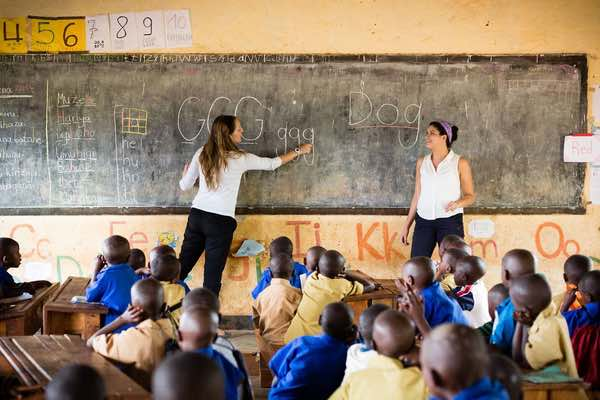
The UK High Commission in Rwanda yesterday evening celebrated its partnership with Rwanda and noted three main events that happened this year: Summit of CHOGM held in Kigali, signature of agreement to receive migrants in Rwanda, and commitment of British football club Arsenal to promote Rwandan tourism.
High Commissioner Omar Daair gave facts and details on UK programmes in different sectors in Rwanda.
He said:
Education:
•Our education programme reaches all 3207 primary schools in the country and has provided training to over 20,000 teachers over the last years.
•As part of our commitment to girls’ education we have piloted girls’ clubs through the Building Learning Foundations Programme. The evaluation shows promising results:
o97% of girls felt that their self-confidence had improved due to their participation in girls’ clubs
o95% felt that their academic performance had improved – even though girls’ club curriculum does not directly cover academic material
o79% felt that their school attendance had increased
Social protection:
•Whilst recovering from the impact of COVID-19, Rwanda has been hit by rising inflation and cost of living. During this time, we have supported Rwanda’s poorest and most vulnerable, delivering much needed cash transfers through the Government’s social protection system – reaching more than 200,000 people with UK funding in the last year.
•In addition to funding, we are pleased to have partnered with the Government of Rwanda through technical assistance to drive forward policy innovations, such as the newly approved graduation strategy. This has the potential to be transformative for the poorest, putting people on a pathway out of poverty.
Inclusion:
•We are proud to have supported the development of NCPD’s disability information management system through the Clinton Health Access Initiative, supported UNABU to provide safe spaces for women with disabilities, and Disability Rights Fund grantees to advocate for the rights of people with disabilities.
•We have also listened, engaging with rights and advocacy groups representing marginalised groups in the development of all new programmes.
Tea sector:
•UK work in the tea sector is going from strength to strength, with the two commercially driven investments in Nyaruguru and Rugabano on track to produce over 2m kilograms of greenleaf tea this year. Already, in terms of the amount of tea in the ground (including both smallholder farmers and Unilever’s industrial block), Nyaruguru is the largest tea estate in Rwanda.
•Smallholder farmers are earning over $600 per hectare – compared with traditional crops earning around $150/Ha. Tea produced in Rugabano is extremely high quality, attracting high prices at auction (2nd highest in Rwanda – only behind Gisovu, which is the top factory in Africa).
Developing Countries Trading Scheme:
•Next year, we will be launching the Developing Countries Trading Scheme, which builds on the current UK preference scheme, which enables countries such as Rwanda to export duty and quota free to the UK. The new scheme puts in place simpler and more generous trading terms with 65 developing countries across Africa, Asia the Caribbean and Pacific including Rwanda. It marks a new chapter in our independent trade policy and covers trade with the UK of £21bn per annum.
•We also maintain our invitation to Rwanda and other countries in the region to join our Economic Partnership Agreement for the East African Community. Kenya has already ratified the agreement which generated significant interest from investors.
Climate:
•At COP27 UK announced £7m support to the new Rwanda Green Investment facility, Ireme Invest, launched by President Kagame. This will provide financial services to quality green investments and foster private sector-led green growth.
•The UK and Rwanda signed an MoU with the International Finance Corporation to collaborate on the cutting-edge African Centre of Excellence for Sustainable Cooling and Cold Chain (ACES) in Kigali. The agreement will boost the development of innovative cooling solutions at ACES and its associated spokes as they establish across Africa. It builds on the £9.5m of further UK funding for the centre announced in August.
Governance and Civil Society:
•The UK Office for National Statistics supported Rwanda’s 2022 census, in addition to ongoing work with NISR on data science and big data, making Rwanda a key regional data hub.
•We continue to work with the Rwanda Revenue Authority to help strengthen the country’s tax administration, and the UK received an award as “best development partner” on tax in November 2022.
•Through several ongoing projects with Rwandan civil society organisations, we have supported the response to Universal Periodic Review recommendations; worked with the LGBT+ community, and championed human rights across sectors. In 2022, the UK also supported increased citizen engagement in policy planning across districts and contributed to the launch of Rwanda’s ongoing media policy review.
•Our support to Gender Monitoring Office has enabled the mainstreaming of gender across district development plans in Southern Province.
•In 2022, the UK continued its Public Financial Management programme with MINECOFIN, contributing to more efficient and effective public spending especially at local government level. For example, the UK has supported the roll out of the School Data Management system to more than 900 secondary schools over the last two years, which has significantly improved school feeding programmes through better targeting and more efficient spending.
High Commissioner Daair urged the public in Rwanda and the region to respect the dignity and rights of gay and LTGB communities. (End)
